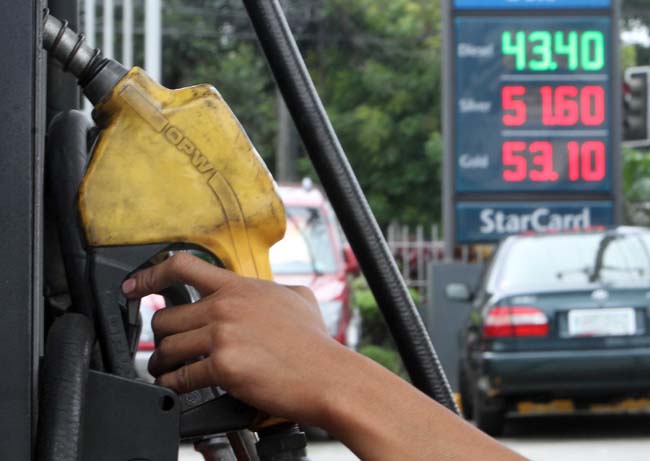ON JANUARY 5, several oil firms announced the implementation of the first oil price rollback of the year. Gasoline products and diesel would be reduced by P0.95 per liter and P0.80 per liter, respectively. Petron Corporation, Petroleum Authority of Thailand-Philippines Corporation and Phoenix Petroleum stated in separate advisories that the cut in pump prices is reflective of the movements in the international oil market.
Petron had implemented a P1.25-per-liter cut in kerosene on the same day, and other local oil firms were expected to follow suit. As of press time, Eastern Petroleum, Seaoil, Unioil, Pilipinas Shell Petroleum Corporation and Chevron Philippines have already implemented the rollback.
Since January to November of last year, retail prices have dropped by about 20%, or P10 per liter, and continue to drop by the day. Prior to the price cut, Metro Manila diesel prices sold at P28 to P31.80 per liter while gasoline sold at P36.69 to P42.76 per liter.
Plummeting gas prices
According to Rappler, energy demand depends primarily on economic growth, and since it is expected that global growth will be hampered until next year, there has been an uneven interaction between supply and demand. Projections indicate slower growth until next year, even among the world’s largest and fastest-growing economies. India’s growth rate, for example, has been the lowest since the 1980s at below 5%, while China’s is expected to drop from 7.4% to 7.1%.
A recent surge in oil supply in the international market along with the lower oil demand has resulted in the price reduction. The International Energy Agency recently reduced its forecast for daily oil demand next year by 230,000 barrels a day. As of last August, the United States (US) has become the world’s largest producer of petroleum, surpassing even Saudi Arabia, the strongest producer of the Organization of the Petroleum Exporting Countries (OPEC). The increase in supply is due to a new oil-extracting technology called “fracking,” which involves unconventional drilling and hydraulic fracturing.
Fracking is the extraction of oil and gas from reservoirs by pumping sand and fracturing oil shales, which had previously been considered “too tight” for economical amounts to be drawn out from. With the help of the new technology, the US is now procuring huge amounts of supply into the global market. According to Fortune, US oil production has risen from about 5 M to 9 M barrels a day since 2008 and has contributed to its energy independence.
Shale oil production, however, is more expensive than traditional oil drilling. Lower oil prices will therefore slow the growth rate of “tight oil,” petroleum produced through fracking, because it needs to sell at US$85 to US$90 a barrel to be profitable. Having said that, with its recent trading price at US$65, fracking will be too expensive to use for oil extraction.
Taking risks
The oil price war between OPEC and those who have adopted fracking techniques is one of the primary reasons for the price rollback. Since fracking is an expensive process, Opec hopes that if they allow the prices to free fall, it will become too costly for its competitors, and therefore unprofitable.
As a cartel, OPEC can use its leverage to maximize profits and decrease production to reverse the price drop. However, Saudi Arabian Minister of Petroleum and Mineral Resources Ali al-Naimi convinced other members to maintain oil production. In an article from USA Today, al-Naimi believes that oil-producing countries need “to accept temporary pain” while prices remain low until fracking becomes disadvantageous for the US.
“They want to protect their market share,” Fernando Aldaba, PhD, professor from the Economics Department, says of Saudi Arabia’s motives. He states that reducing oil production will be especially unfavorable for the country’s small producers.
Regardless of OPEC’s ability to hold prices down until the US buckles under pressure, states dependent on oil revenue can’t keep prices depressed for long. Aldaba explains that oil-producing countries derive its revenues from taxes of production firms. Lowering prices will cause revenues to fall, which may lead to a budget deficit, and “that will further exacerbate their fiscal problems and some governments might fall.”
Philippine setting
As an oil-importing country, the Philippines is expected to reap benefits from the price rollback in terms of economic growth. In a research study conducted by Oxford Economics, the country’s gross domestic product is predicted to increase on an average of 7.6% over the next two years if oil prices reduce to as low as US$40 per barrel.
The oil price drop also entails fewer dollars to pay, and this should translate to lower fares and prices of commodities. According to the Department of Energy’s Oil Industry Management Bureau (OIMB), the Land Transportation Franchising and Regulatory Board had already passed an order to lower fares in Metro Manila and Region 4-A, while the Department of Trade and Industry issued the suggested retail prices for various commodities and are monitoring the prices of goods in the market.
For ordinary consumers, they will be saving a lot from the fall of prices and related goods because the rollback is similar to a tax cut. With extra income to buy other products, this will stimulate economic growth for the Philippines. “Given a low inflation rate, firms should be producing more goods [so] our economy will expand more,” Aldaba advises.
The OIMB also says that lower prices will reduce input costs and encourage production in sectors other than oil, especially energy-intensive sectors. As long as maintaining current oil production is not harming the global economic climate, OIMB says, OPEC’s decision may still be considered worthy. “Considering the foregoing, OPEC’s decision to keep prices down may be a good idea for as long as benefits can still be enjoyed both by producers and buyers,” the OIMB states.




